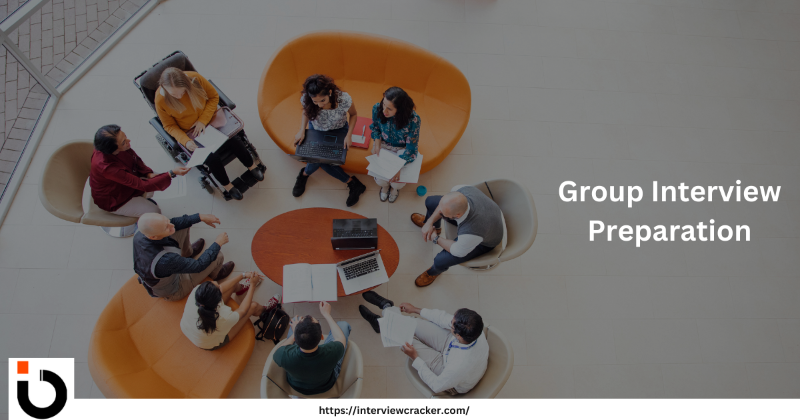Group interviews involve assessing multiple candidates together. Companies opt for this format for several reasons. Firstly, it allows them to observe how candidates interact, collaborate, and communicate in a team setting. It’s particularly valuable for roles that require teamwork or leadership. Additionally, group interviews are time-efficient, enabling employers to assess several candidates in a single session.
Table of Contents
ToggleWhat is Group Discussion(GD) in Interview?
A group discussion in an interview is a structured conversation involving multiple candidates discussing a given topic or scenario. It assesses their communication, interpersonal, and teamwork skills, as well as their ability to express opinions, listen to others, and engage in constructive dialogue. Group discussions are often used by employers to evaluate how candidates interact and collaborate in a group setting, which can be crucial for certain roles and company cultures.
What do You Mean by GD? What is Full Form of GD in Interview?
Full form of GD in interview is Group Discussion. Group Discussion is a types of interviews that takes place in a group to check candidates communication, teamwork, leadership and collaboration skills.
Why Group Discussion is Important in Interview?
Group discussions are important in interviews because they assess a candidate’s
- ability to communicate,
- collaborate, and
- engage with others effectively
- interpersonal skills,
- teamwork,
- leadership skills ,
- the ability to handle group dynamics

How to Prepare for Group Interview? |
Preparing for a group interview can be challenging because you not only need to demonstrate your qualifications and skills but also stand out in a group setting. Here are some steps to help you prepare effectively:
1. Research the Company:
- Understand the company’s values, culture, products, and services.
- Research the position you’re applying for and the team you’ll potentially be working with.
2. Understand the Interview Format:
- Find out what to expect during the group interview. Will it involve group activities, panel discussions, or individual presentations?
3. Practice Your Elevator Pitch:
- Be ready to introduce yourself concisely and professionally. Highlight your skills and qualifications in a way that sets you apart from others.
4. Prepare for Behavioral Questions:
- Group interviews often include behavioral questions. Think of specific examples from your past experiences that demonstrate your skills, teamwork, leadership, and problem-solving abilities.
5. Develop a Strong Teamwork Mindset:
- Be prepared to work collaboratively with other candidates. Show that you can contribute to group tasks and discussions in a positive and constructive manner.
6. Practice Active Listening:
- During group discussions or activities, actively listen to what others are saying and respond thoughtfully. Don’t interrupt or dominate the conversation.
7. Prepare Questions:
- Have insightful questions to ask the interviewers. This demonstrates your interest in the company and the role.
8. Dress Appropriately:
- Dress professionally, just as you would for an individual interview. Make sure your attire is appropriate for the company culture.
9. Body Language:
- Maintain good eye contact, offer a firm handshake, and use positive body language throughout the interview. Show confidence without appearing arrogant.
10. Stay Calm Under Pressure:
- Group interviews can be intense. Practice mindfulness and relaxation techniques to stay calm and focused.
11. Highlight Your Leadership Skills:
- If the opportunity arises, demonstrate leadership qualities, but do so without overshadowing others. Leadership can include organizing group activities, taking initiative, and offering solutions.
12. Prepare for Group Activities:
- If group activities are part of the interview, be a team player. Listen to others, contribute ideas, and help facilitate the group’s progress toward its goal.
13. Follow-Up:
- Send a thank-you email to the interviewers after the group interview, expressing your gratitude for the opportunity and reiterating your interest in the position.
14. Learn from the Experience:
- Whether you receive a job offer or not, view the group interview as a learning experience. Reflect on what went well and what you can improve upon for future interviews.
15. Stay Confident:
- Believe in yourself and your abilities. Confidence can make a positive impression in a group interview setting.
Remember that group interviews are often used to assess how well you can work with others and how you handle group dynamics. It’s not just about your qualifications but also your interpersonal skills. By preparing thoroughly and staying composed, you can increase your chances of success in a group interview.
Topics for Group Discussion in Interview
Group discussion topics for interview can be anything form current affair, social, economic, sports, jobs etc.
Here’s a list of potential group discussion topics that can be used in interviews:
MBA GD Topics:
- The Impact of Technology on Society
- Social Media and Its Influence
- Climate Change and Environmental Responsibility
- The Future of Remote Work
- Ethical Dilemmas in the Workplace
- Diversity and Inclusion in Organizations
- The Role of Artificial Intelligence in Business
- Mental Health Awareness in the Workplace
- The Importance of Soft Skills in Career Success
- The Gig Economy and Its Implications
- Online Education vs. Traditional Education
- Corporate Social Responsibility
- The Future of Healthcare
- The Impact of Automation on Jobs
- The Role of Government in Economic Recovery
- The Influence of Pop Culture on Society
- The Ethics of Data Privacy
- Leadership Styles: Authoritarian vs. Collaborative
- The Effects of the COVID-19 Pandemic on the Workforce
- The Role of Women in Leadership Positions
- Teamwork vs individual work
These group discussion topics can vary depending on the industry and the specific focus of the interview. Interviewers may choose a topic that aligns with the job or the company’s values to assess candidates’ knowledge, communication skills, and ability to contribute constructively to a discussion.
Must Read: Free Interview Preparations site
How to Ace Group Discussion?
Group Discussion Tips for Interview:
- Effective Communication: In a group interview, effective communication is key. Listen actively to other candidates, offer thoughtful contributions, and avoid dominating the discussion. Showcase your ability to communicate and collaborate.
- Leadership Skills: If the opportunity arises, demonstrate leadership qualities. Take the initiative to lead a group activity or guide the discussion. Be inclusive and encourage others to participate.
- Stay Engaged: Maintain a high level of engagement throughout the interview. Show enthusiasm for the role and the company. Make eye contact, nod in agreement, and provide constructive feedback to others.
How to Do Well in a Group Interview?
- Unique Contributions: Make memorable contributions that set you apart. Offer fresh insights, creative solutions, or unique perspectives during group activities or discussions.
- Positive Attitude: Maintain a positive attitude and stay professional even in challenging situations. Employers value candidates who can handle pressure with grace and optimism.
- Follow-Up: After the group interview, send a personalized thank-you email to each interviewer. Mention specific aspects of the group interview that you found valuable or interesting.
Suggested Read: How to face an Interview
How to Start a Group Discussion in Interview if You are a Moderator?
To start a group discussion in an interview:
- Greet and Introduce Yourself: Begin by greeting the group and briefly introducing yourself, including your name and any relevant background or experience.
- State the Topic: Clearly state the topic or question for group discussion. Be concise and make sure everyone understands the subject.
- Set Ground Rules: Establish ground rules for the discussion, such as the time limit for each participant, the order of speaking, and the importance of respectful communication.
- Invite Initial Input: Encourage one of the participants to provide their perspective or opinion on the topic to kickstart the discussion.
- Encourage Participation: Encourage others to join the conversation by asking open-ended questions, seeking input, or inviting different viewpoints.
- Moderate and Guide: As the discussion leader, moderate the conversation, ensuring everyone has a chance to speak and that the discussion remains focused and respectful.
- Summarize Key Points: When appropriate, summarize key points or conclusions reached during the discussion.
Remember to be a fair and neutral moderator, promoting a productive and inclusive discussion environment.
What is a Group Discussion Format?
A group discussion typically follows a structured format to facilitate a productive and organized conversation. Here is a common format for a group discussion:
1. Introduction:
- The discussion leader or moderator introduces the topic and explains the purpose of the discussion.
- Participants introduce themselves briefly.
2. Opening Statements:
- Each participant is given a set amount of time (e.g., 1-2 minutes) to make an opening statement or share their initial thoughts on the topic.
3. Main Discussion:
- The bulk of the discussion involves participants sharing their views, ideas, arguments, and experiences related to the topic.
- Participants take turns speaking, and the moderator may guide the discussion, ensuring that everyone has an opportunity to contribute.
- Participants can respond to each other’s points, ask clarifying questions, and engage in a respectful debate.
4. Summarization:
- Toward the end of the discussion, the moderator summarizes key points, arguments, or conclusions reached during the discussion.
- Participants may also be given a brief opportunity to make closing remarks or reiterate their main points.
5. Feedback and Conclusion:
- Participants may provide feedback on the discussion process or share their overall impressions.
- The moderator concludes the discussion, thanks the participants, and summarizes any actionable takeaways or next steps.
6. Evaluation (Optional):
- In some group discussions, especially in a selection process like a job interview or a debate competition, participants may be evaluated or scored based on their contributions, communication skills, and ability to work collaboratively.
Remember that the specific format and rules of a group discussion can vary depending on the context, such as a job interview, academic setting, or informal discussion among friends. Adhering to guidelines for respectful communication, active listening, and maintaining a balanced and constructive discussion is essential for a successful group discussion.

